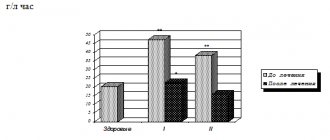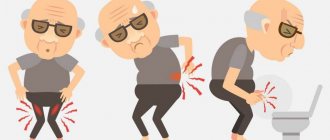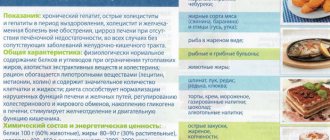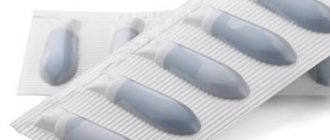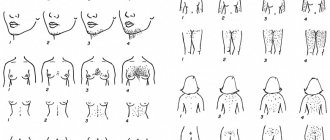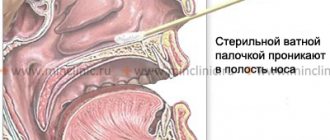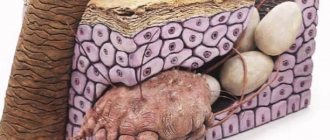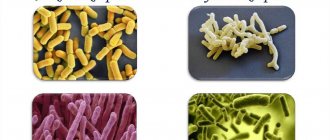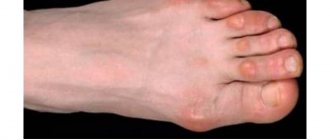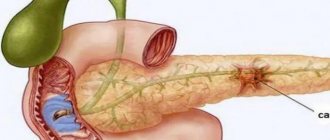What is pancreatitis?
Pancreatitis is an inflammation of the pancreas; it can be very severe and even life-threatening.
The pancreas secretes enzymes that are necessary for the digestion and absorption of food by the intestines. It also produces important hormones (insulin, somatostatin and glucagon) and protects the duodenum from acid that comes from the stomach.
Why does pancreatitis occur?
Malfunction of the gland is provoked by:
- alcoholism,
- cholelithiasis,
- excess intake of fatty foods,
- some medications, etc.
Often the cause is narrowed or blocked ducts of the gland. As a result, enzymes secreted by the pancreas accumulate in it and begin to destroy it itself. The gland becomes inflamed (Fig. 1).
Then, instead of going to the duodenum, these enzymes enter the blood, poisoning the body. Read more about the development of the disease in the article “Pancreatitis”
Figure 1. Development of pancreatitis. Source: health.harvard.edu
Pancreatitis can occur in two forms: acute and chronic. In acute cases, unexpected inflammation of the pancreas occurs. It can lead to the death of an organ or its parts and its replacement with connective tissue and fat. In the best case, acute pancreatitis goes away on its own: there is no need for hospitalization. At worst, it becomes chronic. With it, the structure of the organ changes: the ducts become clogged, the gland tissue becomes covered with scars.
There are known cases of recurrent pancreatitis. Its features are acute pain, but against the background of a changed structure of the pancreas.
Inflammation of the pancreas: causes
The pancreas produces special enzymes and hormones that are necessary to break down food. These are substances that help in the breakdown of proteins, fats, and carbohydrates. It produces not only enzymes, but also hormones, among which one of the most important is insulin. It is necessary to maintain blood sugar levels at the desired level.
The pancreas helps break down sugar to form glucose. But since a large number of people do not lead the healthiest lifestyle, the number of patients suffering from chronic pancreatic diseases is constantly growing.
Inflammation of the pancreas, causes:
- Over the course of a year in Russia, on average, one person drinks about 15 liters of pure alcohol, including older people and newborns. With constant consumption of alcohol, the cells of the liver and pancreas are damaged, which leads to the death of the cells of these organs.
- Unlike the liver, the pancreas is not capable of regeneration. Therefore, illnesses can remain for a long time, even until the end of life. It only takes a few sips of alcohol a day to damage the pancreas.
- Regular overeating, consumption of fatty, fried foods.
- Taking antibiotics, antidepressants.
To maintain good health and improve the health of the organ, it is not enough to take medications, you must adhere to a healthy lifestyle. Only if you follow certain rules and diet, you can forget about attacks of pain in the pancreas area.
Medicine
Symptoms of chronic and acute pancreatitis
Symptoms usually appear after excessive consumption of alcohol and fatty foods. Pancreatitis is characterized by:
- constant severe pain in the left hypochondrium or girdle pain in the epigastrium (upper abdomen),
- repeated vomiting,
- swelling in the upper abdomen,
- cardiopalmus,
- low blood pressure,
- change in stool (at the beginning of the disease, stool is normal, then diarrhea occurs, fatty spots are present in the stool, the smell is sharp and unpleasant),
- weight loss, lack of appetite (in chronic form).
In the chronic form, the pain may be dull and aching in the middle of the abdomen. If recurrent pancreatitis occurs, the acute pain returns. Over time, the pain is replaced by a lack of enzymes, which leads to bloating after eating. The chronic form may be accompanied by decreased appetite and loss of the small intestine's ability to absorb nutrients (malabsorption). A lot of fat comes out with feces; it has an unpleasant odor, is lighter than normal and has greasy stains. This form is also fraught with the formation of false cysts in the gland, which increase the risk of pancreatic cancer.
What are the symptoms of an exacerbation of the pancreas?
An exacerbation is a relapse of a chronic illness, which manifests itself with serious symptoms, including vomiting, diarrhea, and abdominal pain. Typically, deterioration in health occurs due to disruption of the production of enzymes, hormones and functional failures. In most cases, failures appear after drinking large amounts of alcohol or overloading the digestive system with fatty, fried foods.
If the patient leads a correct, healthy lifestyle, then the pancreas may not bother him at all, since there are no surges in the level of hormones and enzymes. During the period of exacerbation, the symptoms are pronounced, severe pain is observed, which sometimes has to be eliminated with injections of antispasmodics. Pain occurs due to tissue death, suppuration and damage to adjacent organs. Due to an imbalance of enzymes, insulin deficiency can occur, which leads to the death of pancreatic cells. It is quite simple to determine a relapse by symptoms.
What are the symptoms of an exacerbation of the pancreas:
- Usually these are severe pains “in the pit of the stomach”, which sometimes radiate under the shoulder blade.
- Nausea and vomiting of bile.
- Dry mouth, temperature at 37-39 degrees.
- Constipation and diarrhea, formation of large amounts of gas.
- Skin color may change to gray-yellow. This is especially visible in the area of the nasolabial triangle.
Treatment is usually carried out in a hospital. Before a person is admitted to the ward, it is necessary to wait for test results and conduct an ultrasound diagnosis.
Pills
Treatment Basics
The approach to treating pancreatitis varies depending on the form of the disease. In acute severe form of pancreatitis, when there is pain and constant vomiting, the patient is hospitalized. In case of a chronic disease and in the absence of relapses, hospitalization is not required; doctors fight the cause of the disease with the help of drugs.
Acute pancreatitis on a CT image. Photo: Hellerhoff / (Creative Commons Attribution-Share Alike 3.0 Unported license)
After admission to the hospital with acute pancreatitis, the patient is not fed, as a rule, for the first 48 hours. A tube is inserted into the stomach to remove its contents. If there are complications (bleeding, acute intestinal obstruction, suppuration, etc.), the patient is referred for surgery.
Next, the doctor prescribes various medications to reduce the load on the gland, reduce pain and prevent the development of infection.
With pancreatitis, control of the production of pancreatic digestive enzymes is vital. Lack of oral nutrition in the first week after the attack is over is the most effective way of such control. Therefore, parenteral nutrition is used, that is, intravenous infusion through a dropper, or enteral nutrition, in which nutritional mixtures are administered through a tube.
Pancreatitis can occur with a complication in the form of death of part of the pancreas or the entire organ (pancreatic necrosis). In this case, doctors adhere to a conservative method of treatment with the help of medications. In case of infected pancreatic necrosis, the use of antibiotics is mandatory. If conservative treatment does not help and the patient progresses to multiple organ failure, suppuration, pancreatic necrosis or pancreatic cancer, surgery is prescribed.
At the first stage, doctors prefer to minimize surgical intervention in the body. First, puncture and drainage of the pancreas and retroperitoneum are performed. To do this, using small incisions, special tubes (drains) are inserted inside, which remove excess liquid and wash the cavity with special solutions.
In case of a more severe condition of the patient and widespread damage to the gland, they resort to alternative treatment tactics, which include:
- laparotomy, that is, external drainage, in which incisions are made in the abdominal wall,
- resection of the gland or removal of it entirely.
Removing the gland is an extreme measure; it is resorted to in a situation where the organ can no longer be restored. It is possible to live without a gland, but you will have to artificially maintain its functions: take insulin, enzyme preparations and follow a very strict diet.
How to cope with an attack of pancreatitis?
The main task when severe pain occurs is to provide the gland with cold, hunger and peace. You should not eat anything and consult a doctor immediately. To relieve inflammation, you need to put a cold compress on your stomach.
Drug treatment of pancreatitis in adults
Medicines play an important role in the treatment of pancreatitis. They carry several functions at once:
- restoration of enzyme deficiency,
- restoration of hormonal levels,
- improvement of metabolic processes,
- fight inflammation
- preventing spasms,
- normalization of blood circulation,
- pain relief,
- compensation of water-electrolyte losses and plasma losses.
The range of prescribed medications can be large; it is important to strictly follow the doctor’s instructions and take all necessary medications on time.
6 tips to help you remember to take your medications
Many drugs for pancreatitis need to be taken regularly, without missing the next dose. To quickly adapt to life during illness, follow these simple tips:
- It is important to take digestive enzymes and some other medications before meals. At first, it is useful to say to yourself: “First medicine, then food.” The idea is to make taking your medications as routine as washing your hands and using a tissue.
- Use a medication organizer. The cells in it can be associated with the time of day or the next meal; some organizers are equipped with a timer and can sound a sound signal. At the end of the month, using the pill box, it is easy to track whether all medications were taken on time (Fig. 2).
- Keep the tablets in a visible place. Don't forget to put them in your bag when you leave home. If you use a lunch box, place your pills in or next to it.
- Tell your friends and family about your illness. Someone close to you can tell you to take your medicine on time if you forget about it.
- Listen to yourself. Renewal of symptoms may clearly indicate missed medications.
- Some medications are better taken twice than not taken at all. Consult with your doctor which of your tablets can be taken in double doses without harm to your health, so you will not be afraid to take the tablet again if you do not remember when you took the medicine.
Figure 2. Medicine organizer. Source: freepik.com
Features of prescribing drugs for pancreatitis in women
Acute pancreatitis in pregnant women is a rare occurrence. Research suggests only three cases out of 10,000. However, as pregnancy progresses, the risk of developing the disease increases. Therefore, the treatment of such patients should be approached very carefully.
There is no agreement among doctors regarding the use of antibiotics during pregnancy. When choosing a medication, the doctor takes into account the severity of the disease, associated complications, and gestational age. In some cases, a positive outcome for the mother is the decisive factor in prescribing antibiotic therapy, even despite the risks of impaired fetal development. In the absence of infection in the bile ducts, as a rule, antibiotics are not prescribed.
Mild forms of pancreatitis may go away on their own. The doctor prescribes antihyperlipidemic drugs, insulin, heparin and diet. In severe cases, the question of termination of pregnancy comes up. The decision depends on many factors and is made by the doctor in each individual case.
Venous parenteral nutrition catheters may cause pregnancy complications. Enteral feeding is preferred, using a tube that passes through the nose and esophagus into the intestines.
Drug treatment of pancreatitis in children
Doctors agree that pancreatitis in children is difficult to diagnose. The reasons for its appearance differ from cases with adults, but the disease itself is more treatable.
Most often, pancreatitis in children occurs against the background of other diseases. Thus, the causes may be inflammation of other organs: the stomach and duodenum (gastroduodenitis), gall bladder (cholecystitis), intestines (enterocolitis), or peptic ulcer. Other causes include the use of certain medications, anatomical features of the gastrointestinal tract, and abdominal trauma.
Treatment is aimed at eliminating the cause of the disease and preventing dangerous consequences. Children are prescribed the same medications as adults. The dosage of each medication is determined by the doctor.
Diet is the basis of treatment of childhood pancreatitis. Overeating or poor nutrition (excessive amounts of canned and fatty foods) can trigger inflammation. It is important to follow fractional meals in small portions, limit the amount of fat, sugar and salt, and absolutely exclude fried and pickled foods, sweet carbonated water, chocolate and ice cream from the diet. For more information about nutrition for pancreatitis, read the article “Diet for pancreatitis.”
Drugs
The main task in the treatment of pancreatitis is to get rid of the cause that caused the inflammation and prevent the onset of complications. Therefore, doctors prescribe a whole course of tablets that should help the digestive system cope with the malfunction (Fig. 3).
Figure 3. To treat pancreatitis, medications of different directions of action are used. Source: MedPortal
Antispasmodics for pancreatitis
Antispasmodics are prescribed to relieve pain and muscle spasms. They can be administered intramuscularly or intravenously. The main ones include those containing drotaverine, mebeverine, pinaverium bromide, m-anticholinergics (metocinium iodide, atropine).
Enzymes and antienzyme drugs for pancreatitis
With pancreatitis, the gland is unable to produce enzymes necessary for digestion. Therefore, the patient must receive them from outside. In addition, the introduction of enzymes allows the gland to reduce their production and rest. Enzymes are prescribed only in the absence of exacerbation. They are divided into those that contain pancreatin (with and without bile components), and those that contain only components of plant origin (simethicone, chymopapain).
In acute pancreatitis, intoxication of the body occurs. Enzymes accumulate in the pancreas and, instead of going further to the duodenum, enter the blood. Anti-enzyme drugs are used to cleanse the body and relieve stress on the pancreas. They are drunk in the first 5 days from the onset of the disease. The main active ingredient of such drugs is aprotinin.
Important! Enzyme preparations must be taken with every meal. The enzyme preparation, its dosage and duration of treatment are determined only by the doctor. Under no circumstances should you take enzymes for acute pain. Such pain indicates worsening inflammation in the pancreas. Taking enzymes in this case will lead to increased intraductal pressure, which in the future will lead to blockage of blood vessels and necrosis.
Antacids
Hydrochloric acid, which is contained in gastric juice, triggers the work of the pancreas. The more of this acid, the more actively the iron works. With pancreatitis, increased activity of the organ leads to pain and complications. Antacids are used to reduce acidity in the stomach. They contain algeldate and magnesium hydroxide, which neutralize stomach acid. Doctors give preference to drugs in liquid form.
Antisecretory
Antisecretory drugs reduce the production of hydrochloric acid, which is contained in gastric juice. Its excessive amount leads to the fact that the alkaline pancreatic secretion is not able to neutralize the acidity of the environment. It is the alkaline environment that provides the best conditions for digestion, so its restoration is one of the tasks in the fight against pancreatitis. Another function of such drugs is to have a cytoprotective effect. They increase the secretion of protective mucus, increase blood flow to the digestive system and promote scar healing.
H2 blockers
These are antihistamine antisecretory agents. Their action is aimed at preventing the excitation of H2 receptors, which stimulate the work of all glands: salivary, gastric, pancreas. They reduce the acidity of gastric juice, delay the production of hydrochloric acid and pepsin, which breaks down protein. These include drugs containing famotidine, ranitidine, etc.
Proton pump inhibitors
Medicines whose purpose is to block the work of the proton pump located in the gastric mucosa and thereby reduce the acidity of the stomach by reducing the production of hydrochloric acid. The same acid that is necessary for digestion, but in large quantities leads to gastritis, and then to ulcers. Such drugs are benzimidazole derivatives. This includes drugs containing omeprazole, pantoprazole, lansoprazole, etc.
Pancreas: medicines and means for prevention
For prevention, it is not recommended to take enzyme-based drugs, as this can cause lazy pancreas syndrome. The organ will produce much less of the enzymes needed to digest food.
Pancreas, medications for prevention:
- Taking sorbents such as Enterosgel and Phosphalugel can be quite useful, especially if you are taking medications or have been poisoned. For the purpose of prevention, it is best to use not medications at all, but a change in diet. Try to eat food 5-6 times a day, in small portions.
- Completely eliminate fatty foods, smoked foods, and lard. It is believed that alcohol and smoking increase the risk of developing pancreatic diseases several times. The main task is to completely give up alcoholic beverages.
- Yoghurt and protein products are recommended in the evening. Never use chocolates as snacks, as they contain a large amount of fat. Low-fat cottage cheese, fruits, yogurt and nuts are healthy. If you approach the nutrition system correctly, then the latest meal should be no later than three hours before going to bed.
- If after dinner you are hungry, or there is not enough to eat, it is recommended to drink a glass of kefir or yogurt, without fruit fillers and sugar, to eliminate the feeling of hunger. Under no circumstances should you exclude foods that contain large amounts of fat from your diet. Among them, it is worth highlighting sea fish and fermented milk products.
- Hard cheese and red fish are very healthy products that contain Omega acids. You should avoid fats found in confectionery, chocolates, and processed meat products, such as sausage. These foods increase the concentration of cholesterol and increase the load on the pancreas and liver.
- It is recommended to take sorbents; drugs that coat the intestinal walls will not be superfluous. Among them it is worth highlighting Almagel . These drugs reduce the load on the pancreas and help regulate the functioning of the stomach. If you have high acidity, then you should stick to a diet containing foods that reduce it. This will be a kind of prevention of pancreatic diseases.
Pills
Other medications for pancreatitis
Depending on the form and phase of the disease in each individual case, based on symptoms and test results, the doctor prescribes additional medications.
Antibiotics
To combat inflammation and pus, as well as to prevent serious consequences in the form of necrosis, sepsis and abscess, antibiotics and antimicrobial agents are needed. The duration of the course usually does not exceed 7–14 days. Carbapenems, cephalosporins, fluoroquinolones, and metronidazole are usually used. In the hospital, such drugs are administered parenterally (intramuscularly or intravenously).
Vitamins
Digestive insufficiency is usually accompanied by a lack of vitamins. Before prescribing vitamin preparations, doctors always send for analysis to find out which vitamins are missing. As a rule, fat-soluble vitamins A, D, E and K are prescribed, since they are responsible for the metabolism of proteins, fats and carbohydrates. They also help enzymes function and protect against pancreatic cancer.
Anti-inflammatory drugs for pancreatitis
In addition to antibiotics, doctors prescribe non-steroidal anti-inflammatory drugs and analgesics. In particular, non-narcotic analgesics (diclofenac, piroxicam, meloxicam, metamizole sodium, etc.). They relieve inflammation and pain.
Is it possible to take choleretic drugs?
Gallstone disease is one of the main causes of pancreatitis. Therefore, choleretic substances, which help prevent stagnation of bile and reduce the load on the pancreas, are on the list of drugs to combat this disease. It must be borne in mind that in acute pancreatitis and exacerbation of the chronic form, choleretic drugs are contraindicated. They are taken only during the period of remission.
Iron supplements
The use of iron supplements in the treatment of pancreatitis is not common practice. In some cases, taking enzyme preparations can lead to a deterioration in the absorption of iron and, consequently, its deficiency in the body. According to other data, the consumption of iron supplements by patients after acute pancreatitis affected carbohydrate metabolism.
Preparations for restoring intestinal microflora
In addition to the basic treatment complex, bifidobacteria and lactobacilli are prescribed. They are designed to restore microflora especially after taking antibiotics. Such drugs are the prevention of dysbiosis, in which the microbial composition of the intestine is disrupted.
What drops are falling
Infusion solutions are prescribed in the form of droppers. This therapy is aimed at maintaining water and electrolyte composition. This includes colloidal and crystalline solutions. They replenish lost energy, protein and plasma.
Plasmapheresis
Plasmapheresis is used to cleanse the body of toxins. During this procedure, blood is taken, the patient's plasma, which contains toxins, is filtered, and donor plasma is returned.
How to restore the pancreas using folk remedies?
To treat pancreatitis, not only medications from the pharmacy, but also folk remedies are often prescribed. Oddly enough, some of them are no less effective than enzymes or absorbers.
How to restore the pancreas using folk remedies:
- You need to purchase dry burdock root and boil three tablespoons of the raw material with 1000 ml of boiling water. It is best to carry out manipulations in a thermos so that the product is well brewed. Seal tightly with a lid and leave for about 3 hours. After this, put it on the fire and simmer for another 7 minutes. You need to take 100 ml three times a day. It is best to drink the decoction before meals. This is an excellent replacement for antispasmodics and non-steroidal anti-inflammatory drugs.
- Buckwheat with kefir. This is a kind of diet that helps relieve stress on the pancreas. If you feel that an exacerbation of the pancreas is just around the corner, or you ate a lot of fatty foods the day before, it’s time to use this recipe. Rinse 150 g of dry cereal with water and mix with 500 ml of kefir. It is best to carry out the manipulation before bedtime. Overnight the mass will swell well.
- In the morning you need to eat half of what you prepared instead of breakfast, and in the evening the second part. Remember that you cannot eat anything at lunch. Tea without sugar is allowed during the day. The last meal of buckwheat and kefir should be 3 hours before going to bed. It is best to follow this diet for 10 days. This will help you lose weight and improve your pancreas.
- Propolis . It is best to purchase such a product in farm stores. It is necessary to dissolve the tincture in the amount of 20 drops in 200 ml of cow's milk. It is best if it is low fat. Take the drug three times a day, before meals. You can also use propolis and chew it.
- Barberry berries . It is necessary to pour 100 g of raw material into 1000 ml of strong alcoholic drink. It is best if it is pure alcohol or vodka. It is worth closing the lid and keeping in a dark place, away from sunlight, for 14 days. You need to take this tincture 15 ml 2 times a day, 40 minutes before meals. The course of treatment is 2 weeks.
Pills
Features of taking medications for pancreatitis
For pancreatitis, any self-medication is strictly contraindicated, even taking painkillers. The doctor determines the method of treatment, selects medications and their dosage strictly individually for each patient. The duration of treatment depends on the form of the disease, its severity, as well as on the patient’s body’s response to a particular drug. It is important not to forget about the medicine: take medications regularly and at the strictly designated time.
Photo: pressfoto / freepik.com
Complications after taking medications
Medicines for pancreatitis, like any medicine, can lead to complications. Antibiotics - for digestive upset, non-steroidal anti-inflammatory drugs - for complications in the gastrointestinal tract and cardiovascular system. Enzyme preparations can cause allergies and lead to iron deficiency. Antisecretory drugs, although they are considered drugs with a minimum of side effects, can cause withdrawal syndrome: the appearance of heartburn and sometimes pain in the sternum after stopping their use. Even vitamins, if taken immoderately and without prior testing, can become not just a useless, but also a dangerous supplement.
The best medicine for the pancreas: reviews
Below you can read reviews from patients who have experienced pancreatic diseases.
The best medicine for the pancreas, reviews:
Oleg. I work in a male team, so often after work we go to celebrate birthdays, anniversaries, and holidays. Naturally, one cannot do without alcohol and fatty foods. We snack on vodka with fatty meat, shish kebab and various cuts of sausage. Unfortunately, we are no longer the same age, so sometimes we have to control ourselves and refuse such celebrations. Recently there was an exacerbation of pancreatitis, so I was in the hospital for 10 days. They gave injections with papaverine and administered drugs that improve the functioning of the pancreas. To normalize liver function, he was prescribed Gepabene; for the pancreas, he took Creon and Pancreatin. Now I’m trying to stick to a diet, not to eat fatty foods, and especially alcohol.
Olga . Due to excess weight and problems with insulin, pain arose in the pancreas area. Perhaps the disease arose much earlier, but made itself felt only now. Twice a year I go to the hospital and have my pancreas and liver treated. For these purposes, I take hepatoprotectors, enzymes and painkillers. Unfortunately, it is impossible to completely cure the pancreas if you do not control your diet and normalize your weight. I recommend that patients suffering from pancreas go on a diet and lose weight. Most likely, the condition will return to normal, and all systems, including the pancreas, will work much better. I do not encourage anyone to adhere to a raw food diet, since it is also harmful for pancreatitis. It is worth consuming less fatty foods and completely avoiding fried foods.
Svetlana . I encountered pancreatitis of the pancreas for the first time, and to be honest, I was shocked. The disease is accompanied by terrible health, vomiting, nausea and constant pain. I was forced to see a doctor; the examination horrified me. I had to swallow a probe to examine my stomach and do an ultrasound. Now I take enzymes and am on a diet. To reduce pain, papaverine and non-steroidal anti-inflammatory drugs were prescribed. The pain has decreased, but in general I plan to reconsider my diet and switch to PN.
Pills
It will be useful to read the following articles on our website:
- The best drink recipes for weight loss
- How to make homemade diet mayonnaise?
- The simplest diet for the lazy
- Diet 6 cereals: menu for the week
- Features of the grapefruit diet
For diseases of the pancreas, not one single drug is prescribed, but complex therapy is used, which is aimed at increasing the outflow of enzymes, as well as relieving spasms.
Is it possible to cure pancreatitis forever?
The likelihood of recovery from pancreatitis depends on the form of the disease and its cause. Sometimes a mild form is caused by eating a lot of fatty foods or drinking alcohol. In this case, the inflammation can go away on its own without leaving any traces: excess fluid will not form around the organ, the ducts will not be blocked, which means enzymes will not accumulate in the gland.
Another thing is alcoholism, complications of gallstone disease, the presence of inflammation or tumors in other organs of the digestive system. Pancreatitis as a concomitant disease requires strict medical supervision. If the situation is advanced: the structure of the organ is changed or part of it dies (pancreatic necrosis), then there is no talk of cure. After completing a course of mandatory drug therapy, patients will have to undergo maintenance therapy, a strict diet, and a complete cessation of alcohol and smoking. According to doctors, the patient should be monitored for at least three months. Physical activity will become a good habit. Physical education improves metabolic processes, helps control weight and cleanses toxins.
Sources
- Minutes of the meeting of the Expert Commission on Health Development of the Ministry of Health of the Republic of Kazakhstan No. 23 dated December 12, 2013. Acute pancreatitis.
- St. Petersburg State Medical University named after Academician I. P. Pavlov. Department of Faculty Therapy, author: Honored Doctor of the Russian Federation, Associate Professor E. V. Kraevsky. Chronic pancreatitis.
- Clinical protocol for diagnosis and treatment No. 18 of the Expert Council of the Republican State Enterprise at the Republican Center for Healthcare Development of the Ministry of Health and Social Development of the Republic of Kazakhstan dated November 30, 2015. Chronic pancreatitis in children.
- First St. Petersburg State Medical University named after. acad. I.P. Pavlova. Treatment of acute pancreatitis. Authors: S. F. Bagnenko, N. V. Rukhlyada, A. D. Tolstoy, V. R. Goltsov.
